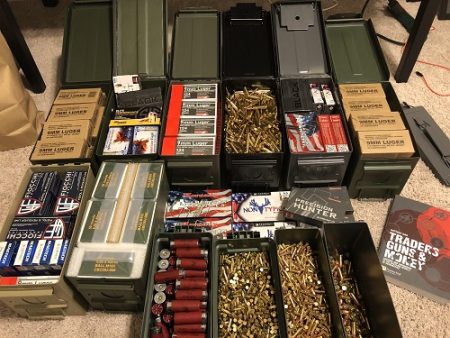
Outdoor Storage Areas: Best Practices for Ammunition Storage
The question of whether outdoor storage areas are used for storing ammunition requires a nuanced answer. While generally discouraged due to safety and environmental concerns, certain regulated scenarios might permit it under strict conditions. This article delves into the complexities surrounding outdoor storage areas for ammunition, exploring the risks, regulations, and best practices to ensure responsible and secure handling.
The Dangers of Outdoor Ammunition Storage
Storing ammunition outdoors presents numerous hazards. Exposure to the elements – rain, humidity, extreme temperatures, and direct sunlight – can degrade the ammunition, rendering it unreliable or even dangerous. Here are some critical risks:
- Corrosion: Moisture leads to rust and corrosion on cartridges, primers, and projectiles. Corroded ammunition can misfire or explode prematurely.
- Degradation of Propellant: Extreme temperatures and sunlight can degrade the propellant, affecting its burn rate and potentially causing dangerous pressure spikes during firing.
- Environmental Contamination: Leaching of lead and other heavy metals from deteriorating ammunition can contaminate soil and water.
- Theft and Vandalism: Outdoor storage areas are vulnerable to theft, potentially putting ammunition into the wrong hands. Vandalism can also damage the ammunition and its containers.
- Accidental Ignition: Wildfires or other heat sources can ignite improperly stored ammunition, leading to explosions and injuries.
Regulations Governing Ammunition Storage
Regulations regarding ammunition storage vary depending on location (federal, state, and local laws) and the quantity of ammunition being stored. Generally, large quantities of ammunition, particularly those stored by commercial entities, are subject to stricter regulations than small amounts kept for personal use. It’s crucial to consult with local law enforcement and relevant regulatory agencies to understand the specific requirements in your area. These regulations often address:
- Permitting: Requiring permits for storing large quantities of ammunition.
- Security Measures: Mandating specific security measures to prevent theft and unauthorized access.
- Environmental Protection: Implementing measures to prevent environmental contamination from ammunition storage.
- Fire Safety: Requiring fire suppression systems and other safety measures to prevent and control fires.
When Might Outdoor Storage Be Considered?
While generally not recommended, there might be very specific and regulated scenarios where outdoor storage areas for ammunition are considered. These scenarios often involve:
- Military Operations: Temporary storage in designated and secured military zones.
- Disaster Relief: Temporary storage during emergency response efforts.
- Large-Scale Demilitarization: Controlled destruction of obsolete ammunition in designated areas.
In these situations, stringent safety protocols and environmental safeguards must be in place, often including:
- Secure Perimeter Fencing: Preventing unauthorized access to the storage area.
- Environmental Monitoring: Regularly monitoring soil and water for contamination.
- Climate-Controlled Containers: Using specialized containers to protect ammunition from the elements.
- Trained Personnel: Employing trained personnel to handle and manage the ammunition.
- Emergency Response Plans: Having detailed plans in place to address potential accidents or incidents.
Best Practices for Indoor Ammunition Storage
Given the inherent risks of outdoor storage areas, storing ammunition indoors is almost always the preferred and safer option. Here are some best practices for indoor ammunition storage:
- Choose a Cool, Dry Place: Select a location that is protected from extreme temperatures and humidity. Basements are generally not ideal due to potential moisture.
- Use Ammunition Cans: Store ammunition in sealed, waterproof ammunition cans or containers. These containers protect the ammunition from moisture, dust, and other contaminants.
- Store Away from Flammables: Keep ammunition away from flammable materials such as gasoline, solvents, and cleaning supplies.
- Secure the Storage Area: Store ammunition in a locked cabinet, safe, or room to prevent unauthorized access, especially by children or individuals prohibited from possessing firearms.
- Inventory and Rotation: Keep an inventory of your ammunition and rotate your stock, using older ammunition first.
- Consider a Dehumidifier: In humid climates, consider using a dehumidifier in the storage area to control moisture levels.
Legal Considerations and Safe Handling
Always be aware of and comply with all applicable federal, state, and local laws regarding ammunition storage. Safe handling practices are paramount, regardless of storage location. Never smoke or use open flames near ammunition. Always handle ammunition with care and avoid dropping or mishandling it. Regularly inspect your ammunition for signs of damage or corrosion. Dispose of damaged or deteriorated ammunition properly, following local regulations. [See also: Ammunition Disposal Guide] [See also: Firearm Safety Tips]
The Environmental Impact of Improper Ammunition Storage
Improper ammunition storage can have significant environmental consequences. As ammunition deteriorates, lead and other heavy metals can leach into the soil and water, contaminating these resources and posing risks to human health and wildlife. Responsible ammunition storage and disposal practices are essential to minimize environmental impact. Proper storage in airtight containers is crucial to prevent corrosion and the release of harmful substances. [See also: Lead Contamination in Soil] Educate yourself on local regulations regarding ammunition disposal and follow them diligently.
Alternatives to Long-Term Storage
Before storing large quantities of ammunition, consider whether long-term storage is truly necessary. If you have more ammunition than you need, consider selling or trading it. Participating in shooting sports and regular range practice can also help you use your ammunition responsibly and avoid the need for excessive storage. Donating ammunition to a local shooting range (if permissible) might also be a viable option. [See also: Responsible Gun Ownership]
Conclusion
While outdoor storage areas for ammunition are generally discouraged due to safety and environmental concerns, understanding the regulations and best practices is crucial. Indoor storage is almost always the preferable option, ensuring the safety and reliability of your ammunition while minimizing environmental risks. Always prioritize safety, security, and responsible handling when dealing with ammunition. Consult with local authorities and experts to ensure compliance with all applicable laws and regulations. By following these guidelines, you can store ammunition safely and responsibly, protecting yourself, your community, and the environment. Remember that the safe and responsible handling of ammunition is paramount.
